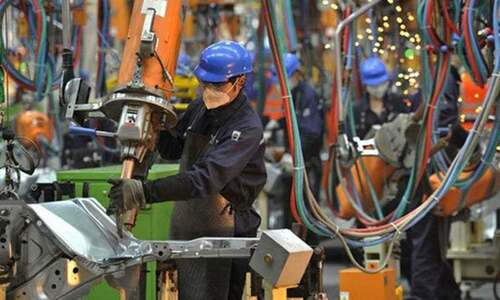ISLAMABAD: Large-scale manufacturing (LSM) shrank 5.49 per cent in November 2022 over the same month last year, according to data released by the Pakistan Bureau of Statistics on Tuesday.
The big industry production contracted for the third consecutive month of the current fiscal year sending fears of major layoffs, especially in the textile sector.
The contraction in industrial output indicates that economic growth will slip further in the next quarter. It is estimated that the second quarter will be more disturbing owing to the suspension of gas supplies to industrial units in winter.
There was a negative growth of 7.7pc in October 2022 and 2.27pc in September 2022 on a year-on-year basis. While a paltry rise of 0.30pc was recorded in August after LSM shrank 1.67pc in July, the first month of the current fiscal year. Between July and November, LSM also posted a negative growth of 3.58pc on a year-on-year basis.However, the LSM grew 3.55pc over October 2022.
Economists have been raising concerns about a slowdown caused by record energy and raw material prices. Moreover, export-based manufacturers have already hinted at a decline in their production due to higher costs of energy and other inputs. The production of 15 sectors shrank and only seven posted marginal rises.
The slowdown started in June when manufacturing activity grew by only 0.2pc compared to the previous month. In the previous fiscal year, large-scale manufacturing grew 11.7pc year-on-year. The production estimate for LSM industries was made using the new base year of 2015-16.
Textile, auto, steel sectors’ production dips in November
During the 2021-22 fiscal year, the LSM sector, which accounts for 9.2pc of GDP, dominated the overall manufacturing sector with 74.3pc of the sectoral share, followed by a 15.9pc share of small-scale manufacturing, or 2pc of GDP.
In November 2022, the textile sector shifted into reverse shrinking by 22.04pc over a year ago. Major negative growth originated from yarn (27.98pc), cloth (13.80pc) and woollen blankets (59.11pc). Nominal growth was reported in the production of other products.
In contrast, the production of garments jumped 49.70pc during the month, driven by higher demand.
In the food group, wheat and rice production dipped by 12.65pc and vegetable ghee by 5.39pc. However, the production of cooking oil is up by 11.72pc and tea (blended) by 0.07pc, respectively.
Petroleum products posted a positive growth of 5.26pc in November 2022, mainly because of nominal growth in the production of petrol and high-speed diesel while almost all other petroleum products recorded a slowdown. The auto sector also saw a 18.97pc slump in November as the production of almost all kinds of vehicles went down, except for buses and diesel engines.
The production of iron and steel dipped 8.71pc during November mainly because of a decline of 23.92pc in billets/ingots, whereas that of non-metallic mineral products dipped 13.07pc and chemical products 7.06pc, respectively. The production of pharmaceutical products dipped 8.34pc, while that of rubber products declined 9.30pc in November 2022 from a year ago.
Published in Dawn, January 18th, 2023













































